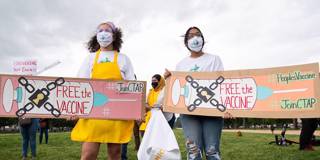Although much of the current COVID-19 vaccine debate is focused on the question of waivers for intellectual-property rights, the transfer of knowledge and technology is only the first part. Equally important are global manufacturing capacity and pricing, either of which could still pose a problem.
MILAN – At this point in the pandemic, the key question is whether vaccine production can be ramped up quickly enough to allow most people to be vaccinated relatively soon. But implicit in that question is another: whether and under what circumstances it is appropriate to suspend domestic and internationally agreed intellectual-property rights. The matter is being discussed in the World Trade Organization now that US President Joe Biden’s administration has surprisingly come out in support of a COVID-19 waiver, exposing a rift between Western governments.
Most agree that if any set of conditions justifies a waiver, this pandemic surely meets them. The millions of lives threatened by the virus ought to trigger a shared sense of humanity. And vaccination is a public good, because everyone’s safety ultimately depends on everyone else’s. In some cases, governments have co-invested with companies in vaccine development, strengthening the case for mandatory licensing. But whatever we do to provide it must not produce adverse or unintended consequences that could impair our responses to future crises of this kind.
We need to start with a basic question: would the proposal under discussion waive IP rights, or would it simply allow for compulsory licensing, under which the company retains its IP rights and the right to earn a return from them? Of the two, compulsory licensing is preferable. By acknowledging that the creator is entitled to a return, it would minimize the adverse effect on future incentives.

MILAN – At this point in the pandemic, the key question is whether vaccine production can be ramped up quickly enough to allow most people to be vaccinated relatively soon. But implicit in that question is another: whether and under what circumstances it is appropriate to suspend domestic and internationally agreed intellectual-property rights. The matter is being discussed in the World Trade Organization now that US President Joe Biden’s administration has surprisingly come out in support of a COVID-19 waiver, exposing a rift between Western governments.
Most agree that if any set of conditions justifies a waiver, this pandemic surely meets them. The millions of lives threatened by the virus ought to trigger a shared sense of humanity. And vaccination is a public good, because everyone’s safety ultimately depends on everyone else’s. In some cases, governments have co-invested with companies in vaccine development, strengthening the case for mandatory licensing. But whatever we do to provide it must not produce adverse or unintended consequences that could impair our responses to future crises of this kind.
We need to start with a basic question: would the proposal under discussion waive IP rights, or would it simply allow for compulsory licensing, under which the company retains its IP rights and the right to earn a return from them? Of the two, compulsory licensing is preferable. By acknowledging that the creator is entitled to a return, it would minimize the adverse effect on future incentives.